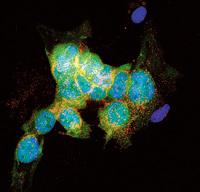Research stem cells, forced to invent paths
2005/10/01 Elhuyar Zientzia Iturria: Elhuyar aldizkaria

Stem cell research has two types of obstacles, some technical and some ethical. The problem is the use of embryos in experiments and the inability to become a child. Many people cannot accept it and, accordingly, the U.S. Health Institute (NIH) has placed those who research with embryonic stem cells under strict conditions.
But
scientists have not got hooked and had to invent paths to overcome ethical barriers. Thus, in recent times there have been great advances that can give rise to research carried out with embryonic stem cells receive the approval of the whole society.
For example, researchers at Harvard University have managed to turn adult cells into as totipotent as embryo stem cells, fusing them with stem cells. For this purpose they have used polyethylene glycol, and although the cells that are formed have twice the chromosomes, the expression of the genes is that of the pleasant cell. This fusion has prevented the use of eggs, so there are no intermediate embryos. In addition, these hybrid cells have been tested in therapy with very satisfactory results.
Other groups have chosen another way: if we guarantee that the embryo would have no other possibility of development, we cannot say that the embryo is destroyed. To achieve this, they have tried two options. The University of Portland blocks an essential gene in the early stages of the embryo. The Princeton University team, instead of blocking the gene, has proposed that another be overstated. In both cases, the resulting embryo cannot progress, but its cells are useful in research.
It is clear that, shortly before or after, scientists will invent the way forward. Obstacles, step by step.




